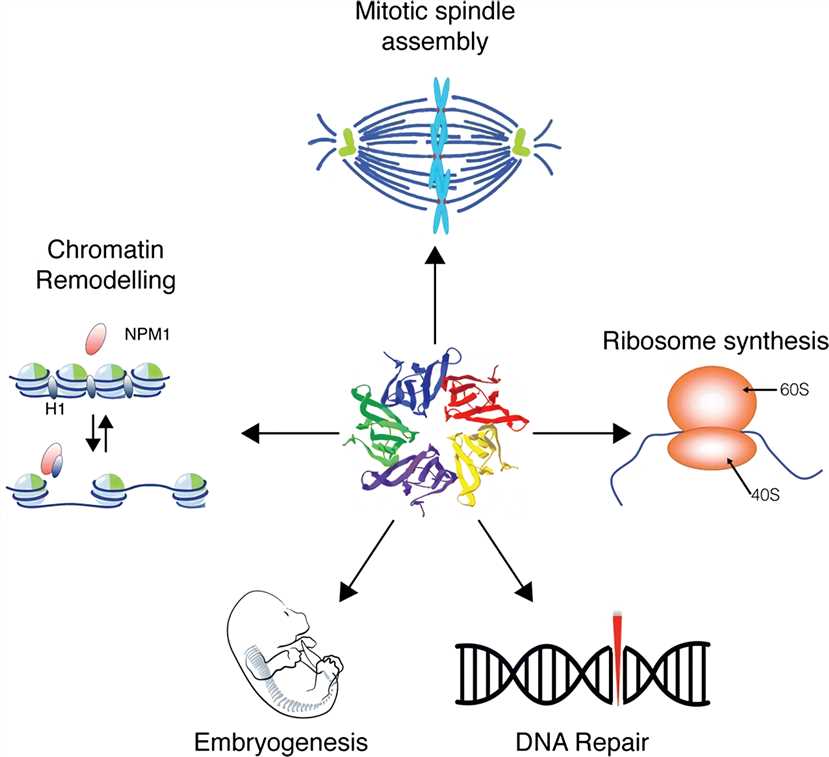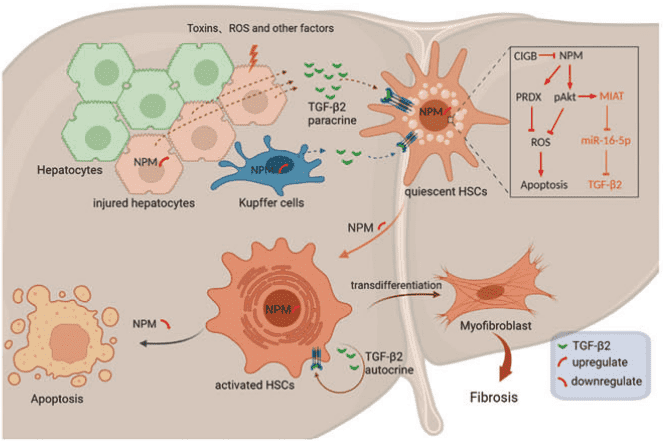NAA Services for Anti-Nucleophosmin (NPM) 1
With Ph.D. level scientists and over a decade of experience in NAA (natural autoantibodies) research, Creative Biolabs has successfully developed a series of promising NAA platforms to provide the best services for our worldwide customers. At present, we have been able to provide a full range of anti-nucleophosmin (NPM) 1 marker services for diseases diagnosis and therapeutic monitoring. Our professional team has been optimized to help you succeed in your NAA research.
Background of Anti-Nucleophosmin (NPM) 1
Nucleophosmin 1 (NPM1), also termed as nucleolar phosphoprotein B23, nucleolar protein NO38, or numatrin, is a ubiquitously expressed nucleolar protein that exists in the nuclei of proliferating cells and involves many cellular processes, including ribosome biogenesis, proliferation, mRNA processing, chromatin remodeling, and genomic integrity. Besides cellular activities, increasing evidence indicates that NPM1 is also implicated in regulating apoptosis and human tumorigenesis. It is observed that over-expression of NPM1 or genetic alterations of NPM1 can promote tumor growth by inactivation of the tumor suppressor p53/ARF pathway, whereas also may function as a tumor suppressor depending on concentrations.
Anti-nucleophosmin 1 (Anti-NPM1) is an autoantibody that produced by a humoral autoimmune response to NPM1. Researches showed that both over-expression of NPM1 and high titer of anti-NPM1 antibody contribute to some cancers like prostate cancer, breast cancer, hepatocellular carcinoma, colon cancer, etc.
 Fig.1 Overview of NPM1 functions within cells. (Joseph, 2016)
Fig.1 Overview of NPM1 functions within cells. (Joseph, 2016)
The Role of Anti-Nucleophosmin (NPM) 1 in Primary Liver Cancer
Primary liver cancer is a malignant tumor that starts in the liver, which differs from metastatic liver cancer. Hepatocellular carcinoma (HCC) is the most common form of primary liver cancer in adults. Risk factors such as hepatitis B/C virus infection, autoimmune hepatitis, alcoholic cirrhosis, non-alcoholic steatohepatitis, and obesity/diabetes are the causes of primary liver cancer. Among them, hepatitis B or C virus infection is the main cause of the HCC, accounting for 80% of the world. Early stages of primary liver cancer usually are symptomless until pain occurs in the upper abdomen on the right side due to an enlarged liver. Therefore, early-stage biomarkers researches are needed urgently to promote screening and diagnosis of primary liver cancer.
As an identified tumor-associated antigen, both NPM1 and its autoantibody anti-NPM1 in sera of HCC patients are much higher than those in normal individuals and other hepatic diseases such as liver cirrhosis and chronic hepatitis. In addition, anti-NPM1 was strongly positive at 6 months before HCC was detected. It has been validated that anti-NPM1 autoantibody in patient sera had potential as an early-stage biomarker for the diagnosis of HCC.
 Fig.2 Working model of NPM in promoting liver fibrosis.2
Fig.2 Working model of NPM in promoting liver fibrosis.2
Aided by our well-established platforms and experienced scientists, Creative Biolabs has bent ourselves in NAA studies for decades. Now, we are able to provide a wide spectrum of NAA products, applications, and extensive NAA services. You can directly contact us and communicate your specific demands with us for more information. We believe that our high-quality services and professional teams will certainly offer you satisfactory strategies.
References
- Box, Joseph K., et al. "Nucleophosmin: from structure and function to disease development." BMC molecular biology 17 (2016): 1-12.
- Ding, Xue, et al. "NPM promotes hepatotoxin-induced fibrosis by inhibiting ROS-induced apoptosis of hepatic stellate cells and upregulating lncMIAT-induced TGF-β2." Cell Death & Disease 14.8 (2023): 575.
Related Services:
- NAA Services for Anti-DNA Topoisomerase II
- NAA Services for Anti-Cytokeratin 8
- NAA Services for Anti-Nucleoside Diphosphate Kinase A
- NAA Services for Anti-CENPF
- NAA Services for Anti-α Fetoprotein (AFP)

